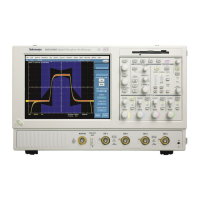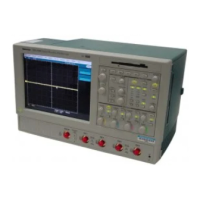Calibration Procedure
5-4
TDS5000B Series Service Manual
Once the connections have been made, follow these steps:
NOTE. If you have just completed the performance verification procedure, you
can skip all the following steps in this setup procedure.
1. Power on the instruments: Turn power on for the controller, oscilloscope,
and signal source. The oscilloscope and the signal source must warm up for
20 minutes before you can begin to execute the test. However, while you are
waiting you can continue with the next steps in this procedure.
2. Ensure that the Wavetek output modules are aligned in time with each other.
To do this, perform the Wavetek 95000 precision alignment 9500 channel
outputs, zero skew operation. Refer to the Wavetek 9500 documentation for
information about doing this procedure.
3. Check the Wavetek 9500 GPIB address: Refer to the Wavetek 9500
documentation for information about setting the GPIB address. If the address
is set to 0 or 1, change it to an address between 2 and 30 (inclusive). Make a
note of the address setting for use later in this procedure.
4. Set the GPIB address of the oscilloscope.
a. If the oscilloscope powered on in the toolbar mode (the default mode),
click the Menu button (upper right corner of the display) to put the
oscilloscope in menu-bar mode. In menu-bar mode, you should then see
a PC-style menu bar across the top of the display.
b. Pull down the Utility menu and then select GPIB Configuration . . . .
This command will display the GPIB Configuration control window.
c. In the GPIB Configuration control window, click the Talk/L isten button
to select Talk/Listen mode.
d. Click the Address readout and then click the up and down arrows or the
upper multipurpose knob to set the GPIB address to 1.
e. Click the Close button to close the control window.
5. Configure the PC controller: Use the GPIB software and hardware on the
controller as necessary to make the following settings:
a. Set the controller GPIB address to 0.
b. Define GPIB devices and their addresses for compatibility with the test
program as shown in Table 5--3.

